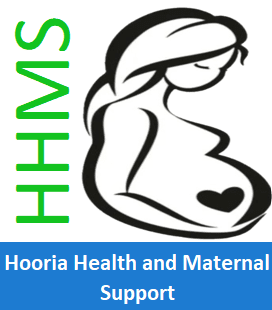FAQ: Questions Expectant Mothers Ask About Postpartum Care

Posted on October 20th, 2025
Introduction: Preparing for Life After Birth
Pregnancy often gets most of the attention, but the real journey begins after the baby arrives. The postpartum period, sometimes called the “fourth trimester,” is a time of recovery, learning, and emotional adjustment.
At Hooria Health and Maternal Support, we believe that preparing for postpartum life is just as important as preparing for labor. To help, we’ve answered the questions we hear most from expecting mothers, so you can feel confident, cared for, and ready for the days ahead.
Q1: How long does postpartum recovery take?
Every woman’s recovery is unique. For vaginal births, the body typically begins healing within six weeks, though full recovery may take longer. Cesarean (C-section) recovery can take 8–12 weeks or more.
But healing isn’t just physical, it’s emotional and mental, too. Many mothers need months to fully regain strength and balance. At Hooria, our doulas help mothers create recovery plans that include rest, nutrition, and community support.
Q2: What’s “normal” to feel emotionally after birth?
Postpartum emotions are a rollercoaster. It’s common to feel joy, anxiety, or unexpected sadness within the first weeks, which is often called the baby blues.
However, if sadness or anxiety lasts more than two weeks, or you feel detached, hopeless, or overwhelmed, it may be a sign of postpartum depression or anxiety. You are not alone, and support is available.
Hooria Health and Maternal Support connects mothers to culturally responsive mental health resources and compassionate doulas trained to recognize and respond to emotional needs.
Q3: What kind of physical changes should I expect?
Common postpartum experiences include:
• Vaginal soreness or bleeding (lochia)
• Swelling in feet or legs
• Night sweats
• Hair shedding
• Breast fullness or tenderness
Your body is adjusting and releasing. Use gentle care, rest often, and contact your provider if you notice severe pain, heavy bleeding, or fever.
Q4: How can I take care of myself while caring for my baby?
Self-care can feel impossible with a newborn, but it’s essential.
• Rest: Sleep when your baby sleeps, even for short naps.
• Nutrition: Eat small, nutrient-rich meals.
• Hydration: Drink plenty of water.
• Support: Ask for help with meals, errands, or chores.
In many cultures, the postpartum period is considered sacred, a time when mothers are nurtured by others. Hooria Health and Maternal Support honors that tradition, offering postpartum doula services that help mothers heal while bonding with their babies.
Q5: How soon can I start exercising again?
Light walking and stretching can begin once your provider clears you, often after 4–6 weeks. Start slow, listen to your body, and focus on recovery rather than performance.
If you’ve had a C-section or complications, healing may take longer. A postpartum doula can help you ease back into movement safely and gradually.
Q6: What about breastfeeding? How do I know if I’m doing it right?
Breastfeeding can be beautiful, but also challenging at first. A good latch should feel like gentle pulling, not pain. If you experience soreness, cracked nipples, or worry about milk supply, reach out for help early.
Hooria Health and Maternal Support’s doulas provide lactation education and hands-on guidance, helping mothers find comfortable positions and build confidence with feeding routines.
Q7: When should I reach out for professional help?
Call your healthcare provider if you experience:
• Fever or foul-smelling discharge
• Severe pain or swelling
• Thoughts of harming yourself or your baby
• Bleeding that soaks a pad in less than an hour
• Difficulty breathing or chest pain
These can be signs that you need medical attention right away.
If you’re struggling emotionally or need extra help adjusting, remember, reaching out for support is a sign of strength, not weakness.
Q8: How can my partner or family support me after birth?
Partners and family play a vital role. They can:
• Handle household tasks
• Offer emotional reassurance
• Encourage rest and self-care
• Help monitor mental and physical changes
At Hooria, we often include family members in postpartum visits, teaching them how to provide meaningful, culturally sensitive support that strengthens the entire household.
Q9: What does a postpartum doula do, and how can one help me?
A postpartum doula offers hands-on and emotional support at home after birth. That includes:
• Helping with infant care and feeding
• Supporting recovery and hygiene
• Preparing meals or light chores
• Offering emotional reassurance
• Connecting you to local resources
In short, a doula helps mothers rest, recover, and rebuild confidence, so you can focus on bonding with your baby.
Final Thoughts: Postpartum Care Is Part of Birth Care
Postpartum care is not a luxury; it’s essential. Healing takes time, compassion, and support. The more you prepare, the smoother your recovery will be.
If you’re expecting or have recently given birth, reach out to Hooria Health and Maternal Support. Our postpartum doulas, cultural liaisons, and wellness team are here to ensure you’re supported, respected, and cared for, mind, body, and spirit.
Contact Hooria Health and Maternal Support today to start a conversation about your postpartum care plan.
Contact Us
Reach Out Today
Explore our caring maternal health solutions designed for you. Connect with our team today and begin a journey towards empowerment and support for you and your family.
